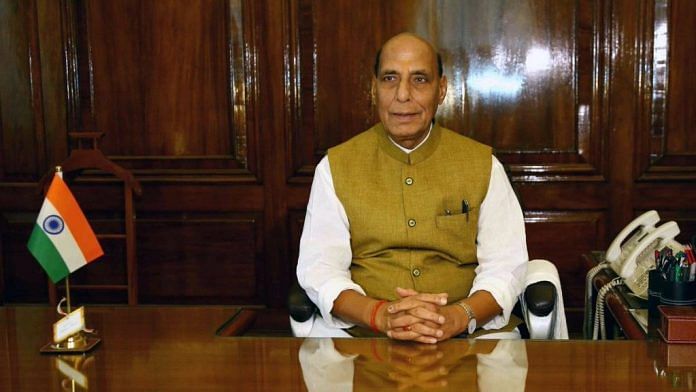
New Delhi: Defence Minister Rajnath Singh will carry a message of peaceful settlement of regional issues, including in Afghanistan and border tensions with China, during his trip to Dushanbe, Tajikistan, for the annual meeting of the Defence Ministers of Shanghai Cooperation Organisation (SCO).
The meeting will be attended by his Chinese and Russian counterparts as well. Although no bilateral meeting with his Chinese counterpart, Wei Fenghe, has been fixed, government sources did not rule out the possibility of having one there.
“Nothing has been fixed. Any possible meeting with anyone, besides the bilateral with the Tajik Defence Minister, will depend on what transpires there at Dushanbe,” a source told ThePrint, when asked if there is a bilateral meeting with the Chinese.
Sources said that a bilateral meeting with Russia could also take place.
Singh, who left around 4 pm Tuesday, will return Friday.
Earlier this month, External Affairs Minister (EAM) S. Jaishankar was in Dushanbe for the SCO Foreign Ministers’ meeting. Jaishnakar had met his Chinese counterpart and State Councilor Wang Yi for an hour-long bilateral meeting.
Rajnath to focus on regional peace
Sources said that during Singh’s address at the SCO meet on 28 July, the minister will stress on the need for peaceful settlement of all issues.
Besides the situation at the Line of Actual Control (LAC), India is keenly following the developing situation in Afghanistan, where the Taliban has launched a bloody war against the government.
“Afghanistan is a key regional issue besides, of course, the tensions with China. India has always stressed on the need for peaceful settlement of issues through talks,” a second source said.
The SCO member states are likely to focus on defence cooperation, and Afghanistan is an area that will come up for discussion, sources said.
Singh’s visit to the SCO meet comes at a time when both India and China have been engaged in an over a year-long confrontation in Eastern Ladakh.
During the last such meet in Russia in September 2020, Singh and Fenghe had met and discussed the border stand-off. Both sides had then decided that there won’t be any further escalation and this eventually led to the disengagement in the northern and southern banks of Pangong Tso in February.
(Edited by Arun Prashanth)
Subscribe to our channels on YouTube & Telegram
Why news media is in crisis & How you can fix it
India needs free, fair, non-hyphenated and questioning journalism even more as it faces multiple crises.
But the news media is in a crisis of its own. There have been brutal layoffs and pay-cuts. The best of journalism is shrinking, yielding to crude prime-time spectacle.
ThePrint has the finest young reporters, columnists and editors working for it. Sustaining journalism of this quality needs smart and thinking people like you to pay for it. Whether you live in India or overseas, you can do it here.